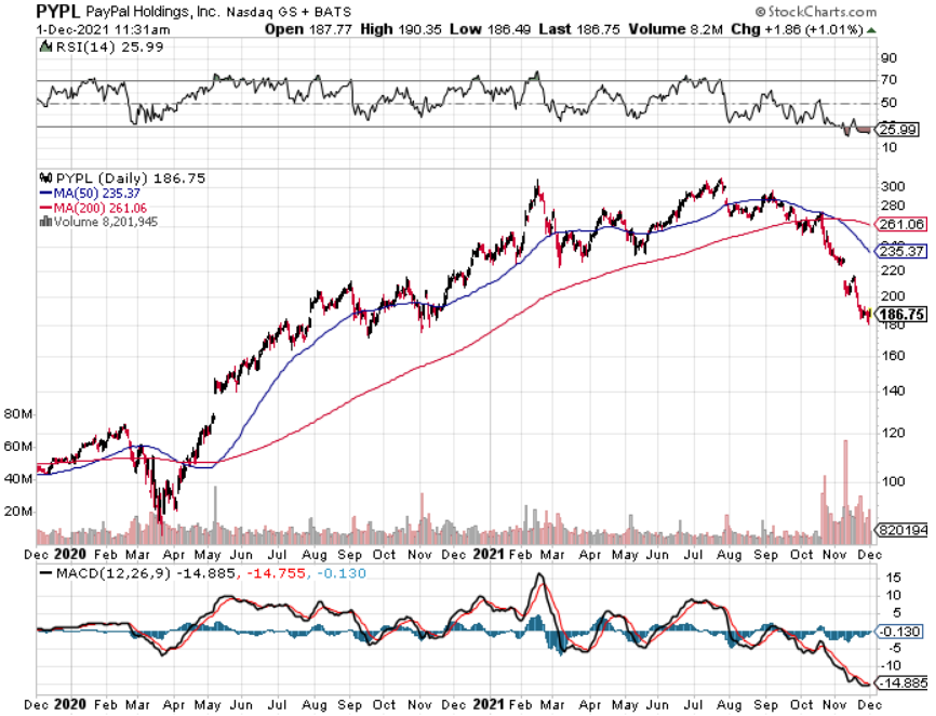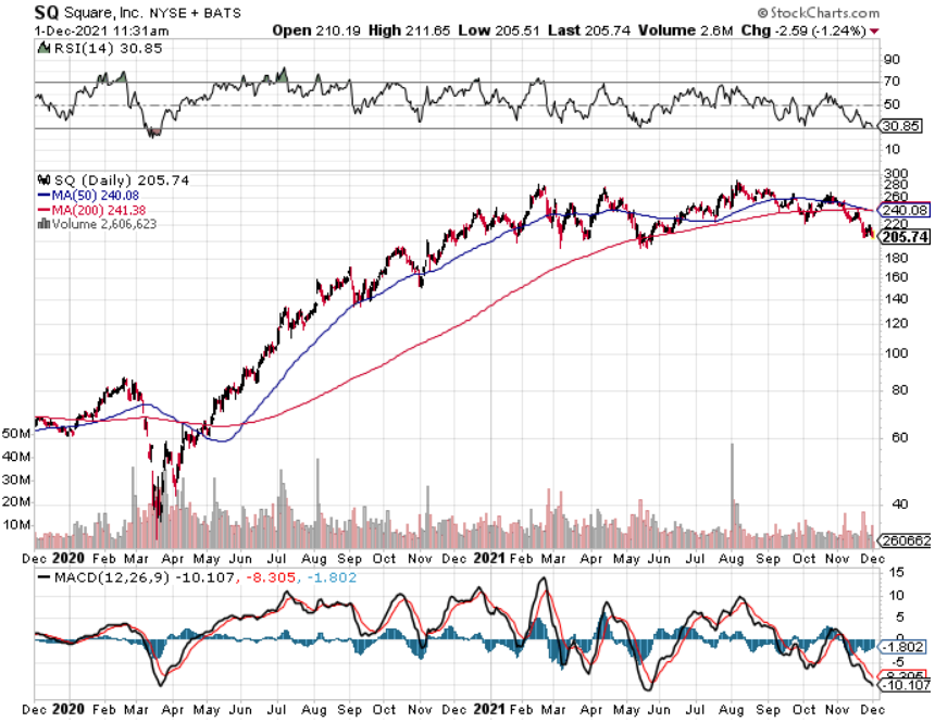Take a Rest From Fintech
The fintech trade is tiring — that is what the underperformance of stocks like PayPal (PYPL) and Square (SQ) is telling us.
Jack Dorsey’s Square has retraced around 25% from its peak and is bang on even from where it was 365 days ago.
Not what you want to hear if you’re a fintech trader.
The pullback from PYPL is even more precipitous declining around 40% from its peak.
Certainly, it would be cliché for me to say that the low-hanging fruit is gone from the fintech trade, but that’s exactly what is happening here.
Not only that, but I would also like to point out that most companies without a home-field advantage ecosystem are getting penalized for exactly that — not having an ecosystem.
Wasn’t it weird how the whole tech sector literally gave us a rip-your-face-off selloff the other day yet, Apple was one of the only tech stocks that reacted positively?
As we move into the late stages of the economic cycle, the goalposts are certainly narrowing for the tech companies, and that’s bad news for SQ and PYPL.
Another way to get penalized is to let that moat narrow which is effectively what has happened to PYPL and SQ.
And that’s the thing with PYPL, it’s just a way to pay, and not an ecosystem.
It plays second fiddle to that of wall gardens and the user trapped in it who is spending and can’t find a way out.
Another point I would like to make is that Twitter (TWTR) at these levels is an ideal buy-the-dip candidate precisely because it’s a great walled garden whose potential has yet to be untapped.
And readers shouldn’t let the mismanagement of the company by former CEO Jack Dorsey turn you off from a great long-term investment.
PYPL would kill for a platform like Twitter and instead needs to grovel to other strategic platforms to allow them to use PYPL’s technology.
PYPL is finally exposed, and I guess more accurate would be to say they are getting undercut by stickier technology that is more convenient to the consumer.
And what does that get you in late 2021?
Downgrades and slews of them which cut blocks the stock at its knees.
We just got one from Bernstein the other day and then it almost becomes a self-fulfilling prophecy with other analyst outlets doing the same thing in a copycat league.
Instead of catching a falling knife in SQ and PYPL, traders need to let these stocks breathe and find support where we know buyers will come in to breed confidence in an upward trajectory.
Easier said than done.
What has been all the rage so far denting PYPL and SQ’s model?
Enter Buy Now Pay Later (BNPL).
Naturally, the differentiated mechanism around which this technology revolves around is the delay in paying, which is never a good concept for a fintech player who rather gets paid ASAP.
Delayed payment is one headache, but then the downward force on fees is another monumental concern, if not downright scary.
This will no doubt trounce margin expansion moving forward and evidence of slowed growth in the latest quarter does not portend well for the company, especially as pandemic tailwinds continue to fade.
Another talking point is BNPL’s lack of credit checks meaning the quality of purchasers will naturally decline, may I even say attract fraudsters as well, and the companies will need to build up loss reserves to compensate for a riskier purchaser profile.
Klarna is another major BNPL company, and they were part of this new industry that took in around 20% of all sales on Cyber Monday.
That rather high number bodes poorly for PYPL in the short term.
Reinforcing the strategic hole of a lack of walled garden is that PYPL is desperate to cultivate partnerships like PYPL’s Venmo joining forces with Amazon (AMZN) — Starting next year, you'll be able to use the money anybody Venmo’s you to buy products directly from Amazon — so long as you live in the US.
But again, Amazon is infamous for replacing outside technology with its own in-house solution over time.
PYPL’s counter solution for BNPL is to enter the BNPL lovefest as well which will effectively trigger a race to zero.
Stopgap solutions will inevitably cannibalize its own business model.
Then let’s point to another walled garden — Tim Cook’s Apple with its Apple wallet.
It’s getting better and with the Apple Card, do they ever really need to spend one second considering a partnership with PYPL or SQ.
There is an inquisition going on in the fintech industry and big body blows will need to be landed for some clear-cut solutions that will ultimately lead to consolidation.
In this precarious environment, don’t get too fancy while fintech is getting elbowed out the way, head to higher ground where balance sheets can absorb just about anything.



